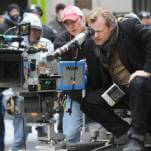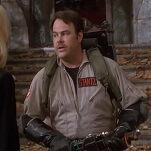Every episode lives or dies according to how much entertainment value comes with the con of the week; there’s not much connective tissue between episodes or overarching narrative arc in a given season, though the show’s creators have tended to bow to current fashions in hip TV by offering a semblance of one. For instance, the current season is set in Portand, and the premiere episode included a cryptic exchange between Nate and Hardison, in which it was implied that Nate has reasons for having selected the city as his current base of operations and that he has not been entirely forthcoming about this with the other members of the team. In terms of most of what’s happened since, that conversation was a pure non sequitur, but fans of the show know that, in the next-to-last possible minute, it will be revisited and its true significance will be revealed.
There’s also a revelation, even if no one has been sitting on the edge of the couch waiting for it. Similarly, there’s no need for a proper finale that ties anything up—it’s not as if the show has just been piling up tantalizing, unsolved mysteries about the characters—but to their credit, the people who worked on this episode—series creator Dean Devlin, who directed, and frequent series writers John Rogers and Chris Downey—do what they can to offer a semblance of that, too. If there’s any reason to feel nervous about that, it’s that Leverage, which is at its best when it’s light and breezy, has always been most likely to choke when trying to go for something grand and ambitious.
The opening here promises the worst. Nate’s team has to break into an impregnable building to help a little boy with a rare form of cancer, a situation that would be pretty sticky even without the reminders that it was the death of Nate’s son that put him on this track. Then the job goes wrong, and Nate is sitting at a desk, being interrogated by Catherine Dent. She informs him that all his friends are dead, and the next thing you know, we get to see Hardison, Parker, and Eliot, in flashback, getting shot and falling down an elevator shaft, and tearfully trying to comfort each other in their final moments. The only thing that makes these scenes bearable is that it’s kind of obvious that they’re not real, and that the crew is presumably still alive. Devlin’s direction isn’t masterly, but he does manage to clue the viewer that what we’re seeing didn’t really happen, which keeps the dying-together scenes from being embarrassing. Unfortunately, they’re not fun to watch, either.
Presently, it’s revealed that Nate was on a mission to steal “the Black Book,” a complete record of all the criminal transactions made by the various bankers and plutocrats whose mischief led to the global financial meltdown. Interpol and world’s other major policing agencies compiled all the evidence of these crimes, but decided that it would be impossible to bring the malefactors to justice, because “the system has to work” and it’s important that the people who’ve always run it continue to do so. Leverage has always used the events of the last several years to firm up its premise by tapping into the widespread feeling that we’ve all been screwed by omnipotent greedheads who are beyond the reach of law; this conspiracy-theory MacGuffin, which comes along with Nate being threatened with “life imprisonment in a secret prison,” like Sean Connery in The Rock, is the show’s final declaration that the people who have been turning to Nate and his team really needed them. The book is also an endless encyclopedia of bad guys who need to brought down a peg, which means that even as its introduction closes the chapter on the adventures of Nate Ford, it promises to open any number of new chapters, should someone at TNT ever be in need of, say, a couple of spin-off TV movies.
The episode ends with Nate proposing to Sophie and retiring from his Robin Hood existence, while Parker, Hardison, and Eliot decide to carry on in his spirit. It’s a bland wrap-up but not a terrible one; I never watched the show in the hope of seeing Nate and Sophie take it to the next level, or Parker delivering Nate’s spiel to a couple of prospective clients while Hardison and Eliot flank her like a couple of Men In Black bodyguards, but seeing it didn’t wreck my day, either. The finale is fun when the actors get a little room to breathe and to strut their stuff, as when Beth Riesgraf becomes exultant over riding a zip-line from the roof of one building to another, or when Gina Bellman gets to show just how badly she can play Lady Macbeth. Moments like this were always the best reason for watching Leverage, which at its best could fit more of them into an episode than are here; probably Devlin and his writers were forced to cram into one hour a story they’d have liked to have stretched into at least a two-parter, and had to cut the fun stuff back to the bone.
Most of what turned out to be Leverage’s final season was pretty generous with the fun stuff; the show became more featherweight than ever, but that ‘s preferable to straining for more serious notes that the series was never going to hit, and the regular cast was uniformly polished and came to play. I’ll miss seeing them in these roles, but the actors, Riesgraf and Aldis Hodge in particular, are due to find other playgrounds to romp in. Leverage was a show that plugged itself into a particular moment. The show may have run out of fresh possibilities, but the moment lives on.






































